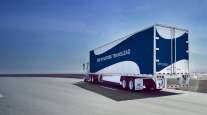Senior Reporter
May Trailer Orders Mark Year’s Low Point

[Stay on top of transportation news: Get TTNews in your inbox.]
U.S. trailer order volume was the lowest of the year but well above last year’s comparable results that were depressed by the coronavirus pandemic.
May orders skidded to 8,676, ACT Research reported, citing manufacturers’ preliminary results.
The impact of supply and staffing headwinds overcame continued strong market demand, experts added.
May’s volume was a 170% gain compared with 3,170 a year earlier — the second-lowest order intake of all time amid the deepening pandemic.
“With industry backlogs for dry vans and reefers extending well into next year, trailer makers are reticent to continue to book orders that would further extend their delivery horizons,” said Frank Maly, ACT director of commercial vehicle transportation analysis and research. “Some fleets may be unwilling to extend their commitments, as well.”

Maly
He said production rates rose, but not as much as trailer makers hoped.
“Until meaningful increases in build rates can be attained,” Maly said, “expect order acceptance by trailer makers to remain somewhat restrained.”
FTR pegged net orders at 9,500.
“This month’s orders were not an indication of market weakness, but an indication that almost everyone has their orders in as far as dry vans and reefers go, for this year. That’s all it is,” said Don Ake, vice president of commercial vehicles at FTR.
Van orders were very soft in May, according to FTR, but vocational trailers remain sturdy as the industrial sector of the economy picks up steam.
“We do expect orders to significantly jump,” he said, “when the order boards open for 2022,” he said. “Under this environment you build up a tremendous pent up demand for orders.”
The more immediate picture includes a very difficult supply chain, labor issues, materials shortages and uncertain commodity prices, trailer makers said.
“This includes all segments now and not just van and reefers,” said Chris Hammond, executive vice president of sales at Great Dane.
“When suppliers are having difficulty getting materials from their own suppliers, the challenges waterfall across everyone who needs those materials to do business,” he said. “We are still preparing for gaps in the supply as we look further down the road into later this year.”
Great Dane is sold out through the end of 2021, and is looking to start taking orders for 2022 in the next few weeks, Hammond said in mid-May. “The first two quarters of 2022 will likely fill quickly when we start taking orders as the transportation industry continues to thrive.”
David Giesen, vice president of sales at Stoughton, said some of its orders have spilled into 2022 because of labor and material shortages. But the company has not officially opened 2022 yet for orders. “Demand remains extremely strong. Order intake is being limited due to the full backlog, labor and supply constraints.”
Sean Kenney, chief sales officer at Hyundai Translead, said the company has not opened order boards for next year, either, and is waiting for the supply chain to “stabilize” before doing so. “Production is steady with higher than normal supply chain challenges daily.”
— ACT Research (@actresearch) June 11, 2021
Meanwhile, the topic of trailer intelligence is drawing greater interest.
“We have seen an increased demand for smart trailers and services, and we expect that will continue to grow as carriers further utilize data to optimize their business,” Hammond said.
He called the work the Technology and Maintenance Council of American Trucking Associations and others are doing to establish trailer-tractor communication protocols “vital” for the future of connected vehicles.
Giesen said Stoughton is ready, “when customer demand picks up,” to integrate the various technologies that are surfacing. “So far, there is very little real demand for technology beyond tracking and cargo sensing.”
Kenney said many fleets are working through new technologies on a trial basis “as they seek to understand how best to leverage the incoming data to truly impact their operation overall.”
In related news, Wabash National Corp. announced Dustin Smith will assume the role of chief strategy officer. He previously served as the company’s senior vice president of global operations
In the first-quarter earnings call, Wabash Chief Financial Officer Mike Pettit said, “Our organization is in the early days of achieving its intended purpose of advancing our strategy, which emphasizes organic growth, leveraging our industry-leading first to final-mile portfolio.”
As far the current production environment, Pettit said ramping manufacturing is never easy, and this year has unique challenges for Wabash and other manufacturers.
“But we see it as a great opportunity to scale up,” he said, “and ensure that we’re firing on all cylinders as customers increasingly become focused on 2022 and what we expect to be a smoother operating environment that will allow us to return the company revenues to levels approaching what was recorded in 2018 and 2019.”
Want more news? Listen to today's daily briefing below or go here for more info:




